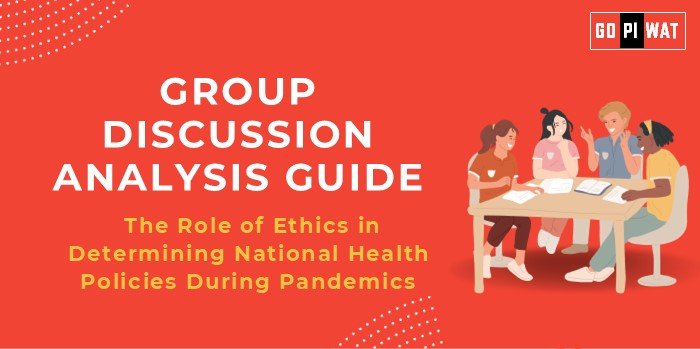📋 Group Discussion (GD) Analysis Guide: The Role of Ethics in Determining National Health Policies During Pandemics
🌐 Introduction to the Topic
Opening Context:
“The COVID-19 pandemic revealed how deeply ethics influence health policy decisions, from equitable vaccine distribution to balancing public health against economic impacts.”
Topic Background:
Ethical frameworks shape national health policies by guiding principles such as equity, beneficence, and justice. These frameworks become critical during pandemics when resource scarcity and competing interests require prioritization. Historical examples include policies during the HIV/AIDS crisis and debates over ventilator allocation in COVID-19.
📊 Quick Facts and Key Statistics
- 💉 Global Vaccine Distribution Inequity: In 2021, only 3% of vaccines reached low-income countries, highlighting ethical disparities.
- 💰 Healthcare Spending: OECD countries allocate 8.9% of GDP on average to healthcare; disparities arise in resource-limited nations.
- 📜 Ethical Guidelines: 70+ countries adopted the WHO COVID-19 ethical framework for vaccine prioritization.
- 📉 Economic Impacts: Pandemic-related GDP loss in 2020 exceeded $4 trillion globally, reflecting the ethical tension between lockdowns and economic stability.
🧩 Stakeholders and Their Roles
- 🏛️ Governments: Develop and enforce policies balancing public health and economic stability.
- 🏥 Healthcare Systems: Implement triage and resource allocation strategies.
- 👥 Citizens: Adhere to and challenge ethical health mandates.
- 🌐 International Organizations: WHO and others provide ethical guidelines and aid distribution.
🏆 Achievements and Challenges
✨ Achievements:
- 🌍 Equitable Access Policies: COVAX initiative provided vaccines to 92 low-income countries.
- ⚡ Rapid Policy Development: Ethical frameworks emerged swiftly during COVID-19.
- 🤝 Improved Global Coordination: Countries collaborated under WHO to distribute critical supplies.
⚠️ Challenges:
- 📦 Resource Inequities: Vaccine hoarding by wealthy nations.
- 📣 Trust Deficits: Misinformation undermined ethical public health directives.
- 🌐 Global Comparisons: While New Zealand succeeded with ethical lockdown policies, Brazil faced challenges with uneven access to care.
💬 Structured Arguments for Discussion
- Supporting Stance: “Ethical health policies ensure fairness, preventing wealth-driven monopolization of healthcare resources.”
- Opposing Stance: “Practical considerations, such as economic survival, should take precedence over idealistic ethics during emergencies.”
- Balanced Perspective: “Ethics should guide health policies but adapt flexibly to practical constraints and socio-economic diversity.”
📚 Effective Discussion Approaches
Opening Techniques:
- 📖 Historical Example: Start with a historical example of ethical policy failure or success.
- 📊 Compelling Statistics: Present data such as vaccine inequity numbers to set the context.
Counter-Argument Handling:
- ✔️ Highlight real-world examples, like New Zealand’s ethical lockdown success.
- 📈 Use data to support rebuttals on mistrust or economic concerns.
📈 Strategic Analysis of Strengths and Weaknesses
- ✔️ Strengths: Builds public trust, promotes fairness, aligns with global values.
- ❌ Weaknesses: May face resistance due to cultural or economic disparities.
- 💡 Opportunities: Leverage ethical frameworks to address future pandemics inclusively.
- ⚠️ Threats: Rising populism and misinformation undermine ethical policymaking.
🏫 Connecting with B-School Applications
Real-World Applications:
- 📋 Ethical resource allocation in healthcare management.
- 🌟 Pandemic response strategies in operations planning.
Sample Interview Questions:
- ❓ “How can ethics and economics coexist in pandemic policymaking?”
- ❓ “Discuss an example of ethical failure during a public health crisis.”
Insights for B-School Students:
- 💼 Learn to navigate ethical dilemmas in policy and business.
- 📚 Explore frameworks like WHO’s ethical guidelines for strategic insights.


